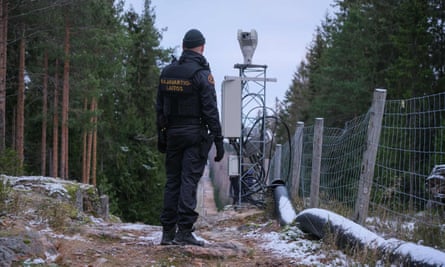Finland’s parliament has overwhelmingly approved legislation allowing the country to join Nato, increasing the chances of it becoming a member of the transatlantic defensive alliance before its Nordic neighbour Sweden.
Both countries last year abandoned decades of military non-alignment in a historic policy shift triggered by Russia’s invasion of Ukraine, submitting simultaneous Nato membership applications and pledging to complete the process “hand-in-hand”.
However, new entrants must be approved by all 30 existing members and while both applications still await approval from Hungary and Turkey, Sweden’s faces objections from Ankara for harbouring what it considers members of terrorist groups.
Finnish MPs voted 184 in favour of accepting the Nato treaties, with seven against and one abstaining, after earlier pushing for the legislation to be passed before general elections planned for early next month in order to avoid a political vacuum.
Parliamentary approval does not mean Finland will automatically join Nato once Turkey and Hungary ratify its application, but the bill must be signed into law by the president within three months, setting a deadline on how long it can wait for Sweden.
Finland’s president, Sauli Niinistö, told reporters last week that he intended to sign the law “as soon as it is approved by parliament” but added that if there were “practical reasons”, he was prepared to wait.
Hungary’s nationalist prime minister, Viktor Orbán, said last week more talks were needed before MPs vote on the membership bids and accused both countries of spreading “outright lies” about the state of democracy and the rule of law in Hungary.
A delegation from Hungary’s parliamentwill visit Finland on 9 March to discuss its Nato membership application, the Finnish foreign minister, Pekka Haavisto, said on Tuesday.
At the start of a long-delayed ratification debate in parliament on Wednesday, however, foreign affairs secretary Péter Sztáray echoed Hungary’s president, Katalin Novák, in calling on MPs to back Finland’s and Sweden’s entry “as soon as possible”.
A vote in Budapest is likely before the end of March. Turkey’s president, Recep Tayyip Erdoğan, meanwhile, has said his country is prepared to approve Finland’s application, but still has strong reservations about Sweden.
Turkey announced on Monday that negotiations with Finland and Sweden would resume on 9 March after talks with Sweden were dropped over a row about protests held in Stockholm, including a burning of the Qur’an in front of Turkey’s embassy.
Foreign minister Mevlüt Çavuşoğlu said this week Sweden had still not fulfilled its obligations under a memorandum signed last year. “Unfortunately, we have not seen satisfactory steps from Sweden,” he said. “It is not possible for us to say yes to Sweden’s Nato bid before we see these steps.”
Stockholm plans to formally decide on 9 March on a long-planned proposal to make it illegal to be part of, or to endorse, a terrorist organisation and aims for the legislation become law by 1 June. Nato has said it hopes both Nordic countries will be members in time for a summit in Vilnius, Lithuania, scheduled for 11 July.

Finland has started construction of a fence along parts of its 1,340km (830-mile) border with Russia to boost security and tackle any attempt by Moscow to weaponise mass migration as a result of its invasion of Ukraine.
Finland announced the start of construction on Tuesday. Terrain work would begin on Tuesday “with forest clearance and will proceed in such a way that road construction and fence installation can be started in March”, the Finnish Border Guard said in a statement.

 1 year ago
75
1 year ago
75










 English (US)
English (US)